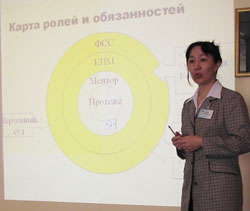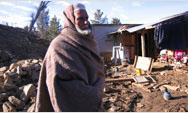You are here » Home » Telling Our Story
Success Story
Instead of strict roles, program stresses open, more collegial relation
A Fresh Approach in Judicial Mentoring

Photo: Chemonics
Judge Inessa Kuanova shares her enthusiasm for and experience with judicial mentorships by traveling nationwide to expand the concept.
“Mentoring, for me, means a way to utilize my own good qualities and share my experience. It’s a perfect opportunity to keep one’s mind open. I get tons of ideas from my young colleague which I never thought of,” said judge Inessa Kuanova.
Inessa Kuanova has served as a judge in the province of North Kazakhstan since 1998. As a new judge, she soon became familiar with the Soviet-era system of “apprenticeship,” in which new judges are paired with senior judges in a strict and subservient relationship designed to monitor the new judge’s performance. However, a new model has recently developed in Kazakhstan.
Started with USAID support, the new judicial mentorship program stresses collegiality, openness, and information-sharing. Senior judges (mentors) are still paired with new judges (protégés), but the mentality and approach is different. The objective is to give new judges a genuine mentor during the challenging early years on the bench, during which they will have to make difficult legal and moral decisions on a daily basis. And due to the open nature of the relationship, new judges pass along fresh ideas and ways of thinking to their mentors, ensuring that the judiciary as a whole is constantly infused with new thinking.
After participating in a USAID training that exposed her to the mentorship program, Kuanova quickly established the program in her province. “I returned back to work full of new ideas and started to promote this program to our newly appointed and experienced judges,” she said.
She also became a mentor herself, and is proud of her impact. “My protégé became more confident. He feels comfortable communicating with elder colleagues and his court Chair, and he is proud of decisions he makes in the courtroom,” she said.
Kuanova participated in another USAID training to enable her to train senior judges on how to be mentors. She now travels to other regions of Kazakhstan to expand the mentorship program. “Teaching is a complex thing, especially for the judiciary. Judges are conservative in learning new things and it is hard to make them practice new skills. USAID gave us the ability to do this, though, by teaching us to train new mentors,” Kuanova said.
Print-friendly version of this page (533kb - PDF)
Click here for high-res photo
Back to Top ^ | 

